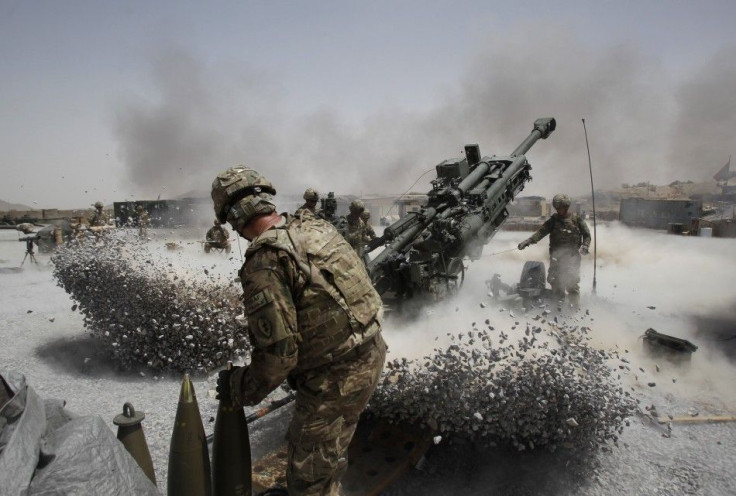Afghanistan War: The Cost of War
ANALYSIS

As most investors/readers know, next year, 2012 is a presidential election year, and the U.S. economy's health, as in many previous elections, is likely to be a determining issue for many voters.
Another issue that may affect the 2012 vote: the Afghanistan War and related spending for it, and for the wind-down of operations in the Iraq War following a major conflict there.
Human Cost
In human terms -- always the highest cost -- the cost of the wars has been enormous. As of Wednesday, 4,476 U.S. Armed Forces personal had died in Iraq, 1,732 had died in Afghanistan. Those brave men and women paid the ultimate price to protect the United States, our democratic way of life, and our freedoms.
The Iraq and Afghanistan wars have also exacted a large financial cost. So far, $801.6 billion has been spent on the Iraq War, $470.9 billion on the Afghanistan War, for a stagger $1.27 trillion spent by the federal government for both military efforts.
What's more, all of that defense spending has been borrowed -- the United States has essentially fought two wars by using a credit card. Hence, add roughly 3 percent to 4 percent in annual financing costs to that $1.27 trillion total, or $37 billion to $49 billion per year in increased debt service -- just for the two wars.
U.S.: Underinvestment in Public Goods
But beyond the debt service, there is the opportunity cost of the war spending, or in this case, call it the opportunity lost. The United States to-date has spent $1.27 trillion on two controversial wars with uncertain foreign policy outcomes. Imagine what that $1.27 trillion could have accomplished if the money was dedicated to social programs?
It could have provided seed money -- a trust fund -- for universal health insurance.
The nation also could have better-funded both secondary and higher education programs.
Concerning infrastructure, the nation could have renovated hospitals, airports, the interstate highway system and other roads and bridges, built a smart grid, provided aid to towns, counties and states to improve/expand mass transit systems, beefed-up research and development grants to speed the development of a next-generation electric car, provided funding to make broadband access available almost everywhere in the U.S., and more.
Paying for two wars with a credit card and diverting resources from critical public goods and social services is more than enough of an indictment of the previous decade's 2001-2008 foreign policy, but the bad implications of the policy mistakes unfortunately do not stop there, as scholars Nouriel Roubini, an economist, and Paul Kennedy, an historian point out.
Roubini, the New York University economist known as Dr. Doom for his accurate prediction three years ago of the financial crisis stemming from the bursting of the U.S. housing bubble, says the United States has underinvested in public goods. The nation, Roubini said, now must invest in human capital, skills training, and a social safety net to increase productivity and enable workers to compete, be flexible, and thrive in a globalized economyd.
U.S.: Imperial Overreach
Kennedy is even more sobering in his model, outlined in The Rise and Fall of the Great Powers. (Random House: 1987)
In it, Kennedy argues that empires have a tendency to extend themselves militarily beyond their economy's ability to support it, leading to imperial decline. As military expenses grow, these countries reduce investments in economic growth, which eventually leads to the downward spiral of slower growth, heavier taxes, deepening domestic splits over spending priorities, and weakening capacity to bear the burdens of defense. He called it imperial overreach. Examples of defense spending-induced imperial decline would include Britain, and the former Soviet Union.
And does the thesis sound like one other country you may know? It sounds like the United States in 2011, after the Bush war years, 2001-2008, in which high military spending (and a 2001 income tax cut) both over-consumed resources that should have been allocated to public goods (infrastructure) and social programs (education, health care); the Bush era policies also changed the nation's fiscal trajectory from surplus to massive deficit.
The United States as 2012 Approaches
Where is the U.S. today, from a great power standpoint? Kennedy argues, the broad trend of decline is under way, and that public officials must manage this power erosion so that it occurs slowly and smoothly.
Public Policy/ Economic Analysis: Is the United State declining? Clearly, the 2001-2008 period marked a decade of descent, and the Iraq and Afghanistan campaigns read like a case study from Kennedy's Great Powers book. Hence, some power decline relative to China and Russia is obvious.
But does the U.S.'s decade of descent, a decade of policy errors, mean the American Empire is over? The calculation forwarded here is that it is not, if the nation can end the Afghanistan War, in addition to its announced withdrawal from Iraq, cut defense spending to tolerable levels, and redirect those resources to public goods, social services, and research.
In other words, the United States is at a critical moment in its history: it has already spent about $5 trillion too much on defense programs in the past 20 years, since the end of the Cold War in 1991, with the Iraq/Afghanistan campaigns adding the double-miscue by being entirely from borrowed funds. The signs of underinvestment in public goods are obvious. Further, the U.S.'s sluggish economic growth, again, reads like a clause from Kennedy's decline thesis. Is the decline reversible? Again, in my interpretation, if the U.S. can cut military spending and re-emphasize public goods -- end its imperial overreach -- the nation will start arcing higher.
© Copyright IBTimes 2024. All rights reserved.











